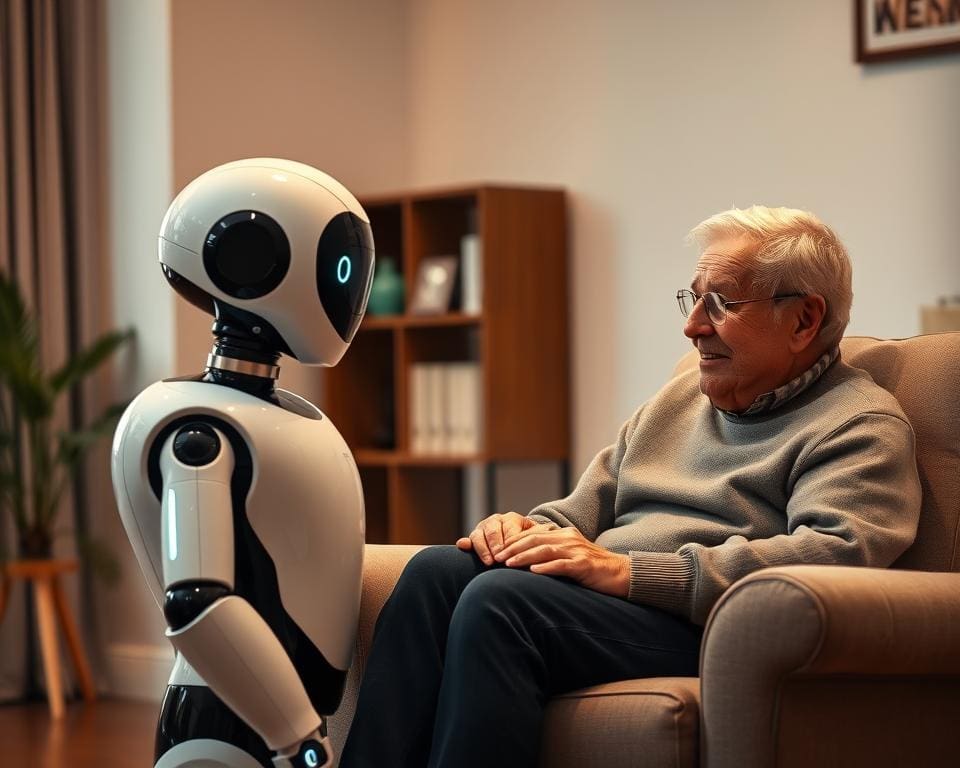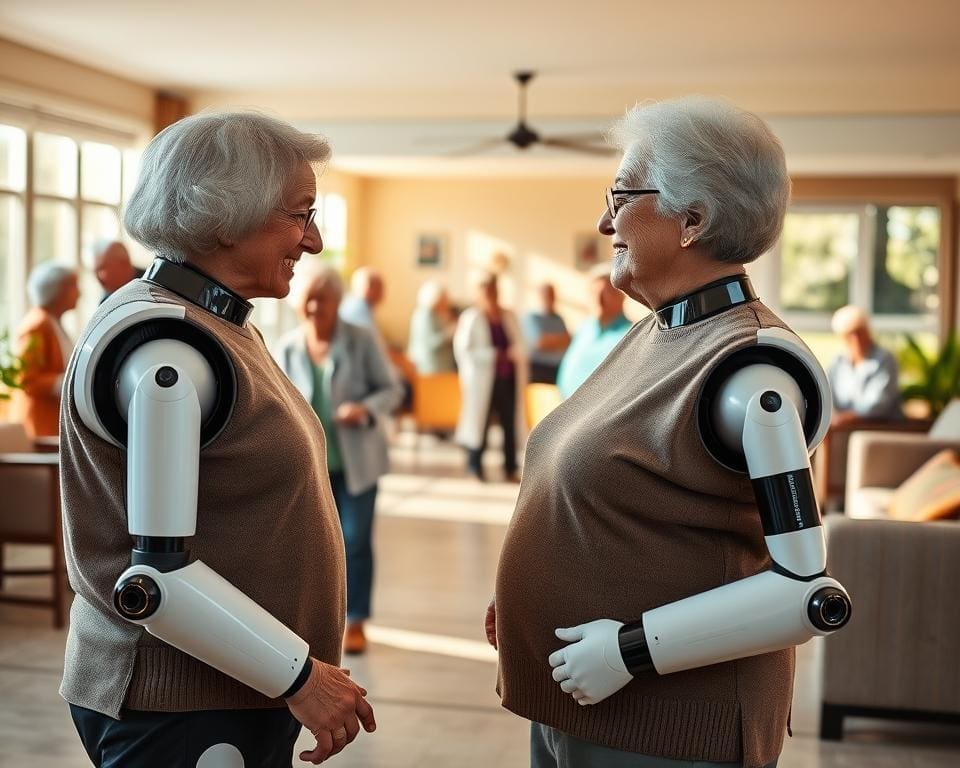The rapid advancement of technology has brought us to a pivotal moment in elder care, prompting the question: can AI-powered robots assist in elderly care? With the UK experiencing a significant increase in its senior population, the demand for effective solutions in AI in elder care is paramount. Traditional methods often fall short in addressing the growing challenges of loneliness and dependency among older adults, creating a pressing need for innovative approaches. Robotics for elderly assistance has emerged as a promising field, poised to transform the way we support our ageing population.
As we delve deeper into the potential benefits of AI in senior care, it is crucial to recognise the changing landscape of elderly support. These intelligent companions not only offer practical aid but also enrich the lives of the elderly, fostering a sense of connection and independence. A brighter future in elderly care awaits, driven by technology that understands and meets the unique needs of our seniors.
The Rise of AI in Elder Care
In recent years, the integration of AI technology for seniors has significantly changed the landscape of elder care. Understanding how these advancements serve the needs of older adults is crucial. Various AI systems incorporate natural language processing and machine learning, tailored to be user-friendly for seniors. This technology allows for the development of innovative solutions that make daily living easier and safer for the elderly, paving the way for enhanced wellness.
Understanding AI Technology for Seniors
AI in elder care employs advanced algorithms to provide support that resonates with the unique requirements of older individuals. Elderly-friendly design principles ensure that tools, applications, and interfaces are accessible. Various robots for elderly assistance provide companionship, engage in conversations, and help manage health routines, creating an environment that fosters independence while ensuring comfort.
The Role of AI in Health Monitoring
The role of AI in health monitoring cannot be overstated. With a range of sensors and health monitoring devices, AI technologies collect and analyse data pertinent to seniors’ health conditions. Wearable technologies track heart rates and physical activity levels, while smart medications can ensure adherence to prescribed treatments. By offering real-time health assessments and timely alerts for caregivers, AI enhances medical oversight in technology in elderly care, promoting proactive rather than reactive health management.

Can AI-powered robots assist in elderly care?
The integration of assistive robotics into elderly care is revolutionising the way we support our senior populations. Robotics for elderly assistance is gaining traction as technology evolves to meet the specific needs of older adults, empowering them to maintain their independence and improve their quality of life.
How Robotics Transform Elderly Assistance
Robots play a pivotal role in senior living by offering companionship, reminders for medication, and even help with daily tasks. Companies like SoftBank Robotics have developed AI companions for the elderly that can engage in meaningful conversations and understand emotional cues. Such interactions are crucial in minimising feelings of loneliness and isolation among seniors.
Innovative Features of AI Companions
The innovative features of robots specifically designed for elder care include advanced conversational abilities and emotional recognition systems. These AI companions can adapt to individual preferences, providing personalised support that aligns with the needs of older adults. The presence of these robots not only assists with practical tasks but also fosters a sense of companionship, enhancing overall well-being in the lives of seniors.
Benefits of AI in Senior Care
The integration of technology in elderly support has led to remarkable benefits in senior care. From fostering independence to combatting loneliness, AI-driven solutions are significantly enhancing the quality of life for older adults. This section delves into how AI companions for the elderly are transforming their daily routines and providing support in meaningful ways.
Enhancing Independence and Autonomy
AI in elder care facilitates enhancing independence in elderly individuals by promoting self-sufficiency. Smart home systems allow seniors to perform daily tasks with ease, from adjusting lighting to controlling appliances. These technological innovations empower seniors to maintain control over their living environments, leading to a heightened sense of autonomy.
Reducing Isolation and Loneliness
Solitude reduction plays a crucial role in the overall wellbeing of seniors. Many face the challenges of isolation, which can lead to significant health issues. AI companions for the elderly provide not just assistance but companionship. They help bridge the social gap by engaging users in conversations and activities, fostering connection and emotional support. Testimonials reveal how these interactions have rejuvenated the lives of many seniors, encouraging increased socialisation and interaction.
Assisting with Daily Activities
AI technologies offer comprehensive assistance with daily activities, delivering valuable help to seniors in performing essential tasks. Robotics for elderly assistance can handle various chores, including meal preparation and medication reminders. These innovations reduce the burden on caregivers while simplifying life for seniors, allowing them to enjoy a higher quality of life. Regular interactions with these technologies illustrate the numerous benefits of AI in senior care, enhancing not only functionality but also individuals’ overall satisfaction.
Technology in Elderly Support
In the contemporary landscape of elderly care, technology plays a pivotal role in enhancing the quality of life for seniors. The integration of smart home devices and telehealth applications makes daily routines more manageable and healthcare more accessible.
Integrating Smart Home Devices
Smart home devices significantly contribute to technology in elderly support by creating safer living environments. Voice-activated assistants like Amazon Echo and smart thermostats allow seniors to control their surroundings effortlessly. These innovations serve to:
- Facilitate easy communication through voice commands.
- Automate home systems for energy efficiency and comfort.
- Provide safety measures, including emergency alert systems.
With these features, smart home devices not only promote independence but also streamline daily activities, allowing older adults to live comfortably and securely at home.
Telehealth and Remote Monitoring
Telehealth applications are transforming elder care by providing virtual access to healthcare professionals. These platforms make it easier for seniors to receive timely medical advice without the need for frequent hospital visits. Remote monitoring for seniors enhances this experience by enabling continuous health oversight. Key benefits include:
- Real-time health tracking through wearable devices.
- Convenient virtual consultations, reducing travel stress.
- Improved management of chronic conditions through regular monitoring.
This integration of telehealth and remote monitoring not only alleviates the burden on healthcare systems but also ensures that seniors receive the care they need, precisely when they need it.
Challenges and Considerations
While the potential of AI in elder care is remarkable, there are significant challenges in AI elder care that warrant careful examination. One prominent issue is the high cost of implementing advanced robotics, which may not be feasible for all care facilities or individual households. Investing in these technologies often requires substantial financial resources, pushing the boundaries of budgets already stretched by rising healthcare costs.
Privacy concerns also come to the forefront when considering robotics in elderly assistance. AI systems that monitor health data must navigate stringent privacy regulations to protect sensitive information. This tension between innovation and data protection raises critical questions about how to securely manage personal information while providing effective care.
Moreover, the human touch remains an irreplaceable aspect of caregiving. AI in elder care should be seen as a complement to, rather than a substitute for, human interaction. Addressing the extent to which technology can relieve care burdens while still prioritising empathy and connection is essential for the success of these tools. As we move forward, it is vital to balance advancements in AI with an unwavering commitment to maintaining the warmth and compassion inherent in caring for the elderly.









